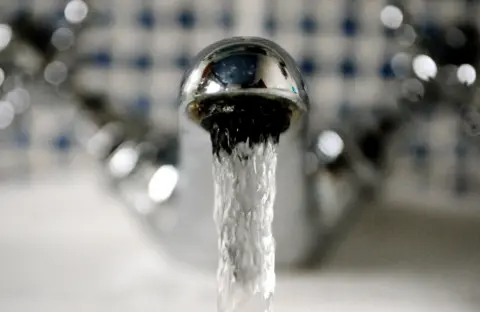RAF base investigated over toxic chemical fears
 BBC
BBCAn RAF base is under investigation over fears toxic "forever chemicals" could be leaching into nearby drinking water sources and nature sites.
RAF Marham in Norfolk is among three locations facing a Ministry of Defence (MoD) probe into whether PFAS - a group of synthetic chemicals - was leaking into the environment.
The base near King's Lynn was identified as a high-risk pollution threat by the Environment Agency (EA), according to the Local Democracy Reporting Service.
However, Anglian Water said there had been no breaches in drinking water.
MP Terry Jermy said: "This is a matter that should be taken with the utmost concern and severity, and I fully expect the government to take action."
RAF Marham is close to drinking water safeguard zones and several protected nature reserves.
PFAS are known as "forever chemicals" because they can take thousands of years to break down. They have been linked to serious health conditions and major environmental harm.
PFAS have been found in some firefighting foams, which were used extensively at military bases for decades – including at RAF Marham.
Certain forever chemicals are banned from firefighting foam, with a fuller ban expected by 2030.
An investigation by Watershed and the Guardian revealed high levels of PFAS in raw, untreated drinking water sources near several RAF bases, including at RAF Mildenhall in Suffolk.
 Rui Vieira/PA Wire
Rui Vieira/PA WireJermy, Labour MP for South West Norfolk, said: "This is a historic issue that clearly needs an immediate and thorough inquiry.
"If nothing is done to tackle forever chemicals, generations of communities' health, environment and economy will suffer as a result."
A government spokeswoman insisted there was no evidence that public drinking water contained unsafe levels of PFAS.
The official added that "MOD investigations remain ongoing" and the government is working with the EA to assess its sites.
An EA spokesman said: "The global science on PFAS is evolving rapidly and we are undertaking a multi-year programme to better understand sources of PFAS pollution in England."
Anglian Water is responsible for detecting PFAS in drinking water said to date, there had been no breaches.
The firm has joined other water companies in urging the government to take action to stop PFAS from being used in manufacturing processes.
"Currently, there is no ban or restriction," the spokeswoman said, adding: "It cannot be eradicated by water treatment."
Follow Norfolk news on BBC Sounds, Facebook, Instagram and X.
